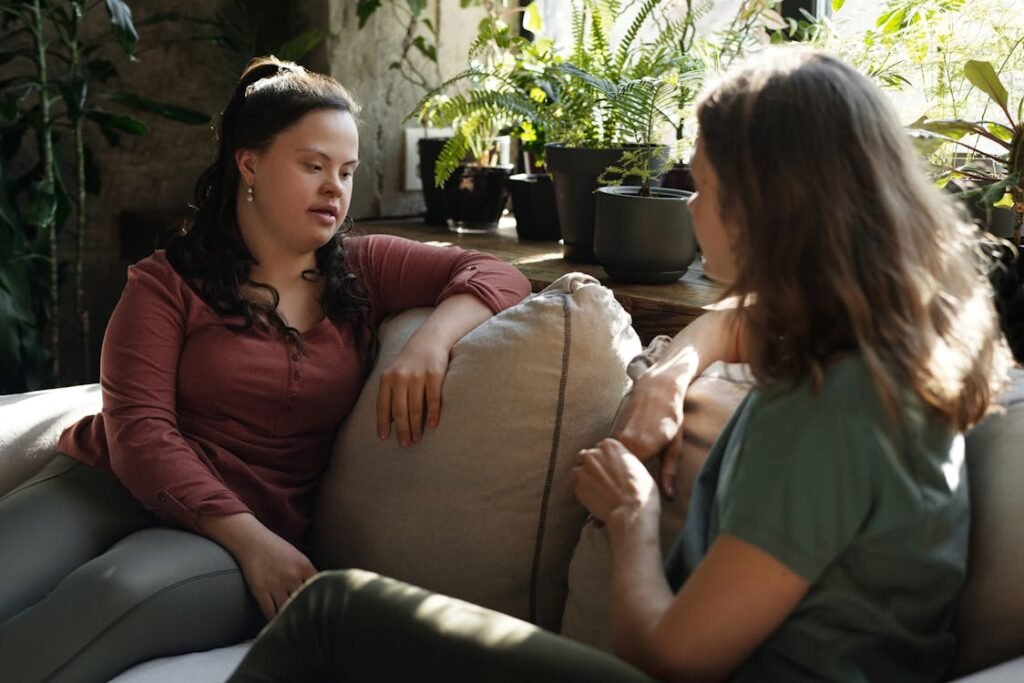Losing a limb is a life-changing experience that brings not only physical challenges but also emotional struggles. Many amputees feel isolated, overwhelmed, and unsure of how to move forward. While medical professionals and family members offer valuable support, there is something truly powerful about connecting with others who have lived through the same journey.
Peer support groups give amputees a sense of belonging, encouragement, and guidance. They provide a safe space to share experiences, learn practical tips, and build friendships with people who understand the unique challenges of life after amputation.
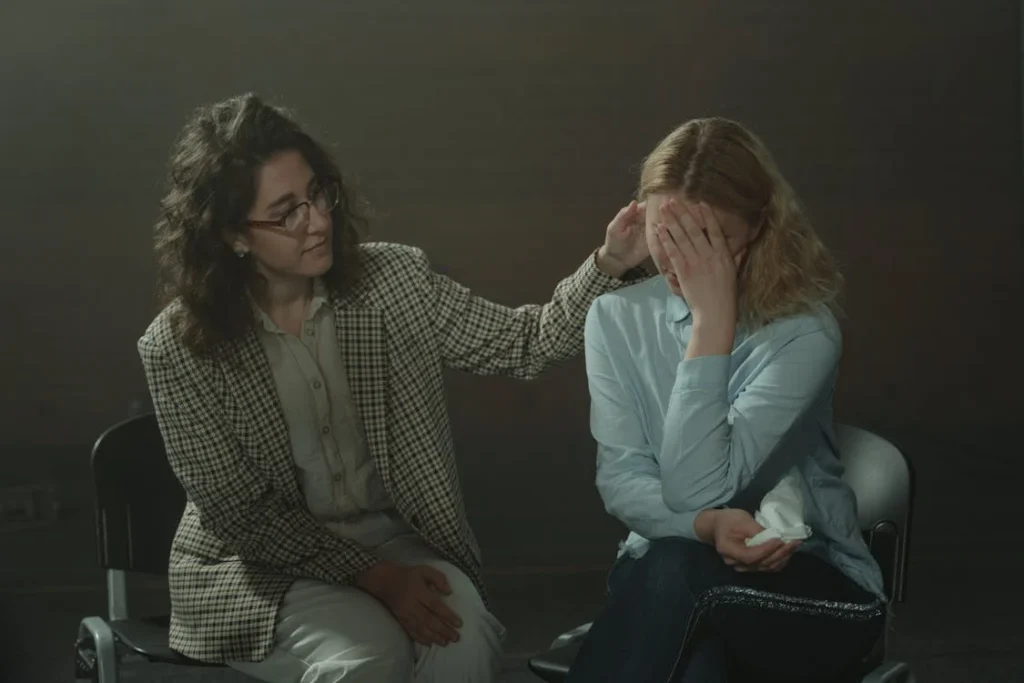
How Peer Support Groups Help Amputees Heal Emotionally
The emotional impact of losing a limb can be just as challenging as the physical recovery. Many amputees experience feelings of grief, frustration, and even depression as they adjust to their new reality.
While friends and family can offer love and support, they may not fully understand what it feels like to live with limb loss. This is where peer support groups play a vital role.
A Safe Space to Share Feelings
One of the biggest benefits of a support group is having a place to talk openly about emotions without fear of judgment.
Many amputees struggle with feelings of anger, sadness, or anxiety but may hesitate to express these emotions to people who have not been through the same experience.
In a support group, everyone understands. There is no need to explain or justify feelings because the people around you have felt them too.
Talking to someone who has already faced similar challenges can provide reassurance. It helps to know that others have felt the same way and have found ways to overcome their struggles.
Simply hearing, “I’ve been there, and it does get better,” can bring a deep sense of relief and hope.
Reducing Feelings of Isolation
After an amputation, it’s common to feel alone. Seeing others go about their daily lives while struggling with mobility or adjusting to a prosthetic can be discouraging.
A peer support group reminds amputees that they are not alone in their journey. Being surrounded by others who understand their struggles can help reduce feelings of loneliness and build a sense of community.
Regular meetings or interactions with a support group create a social connection that many amputees miss after their amputation.
Whether in-person or online, these groups provide an opportunity to bond with people who genuinely understand the emotional ups and downs of recovery.
Encouragement to Keep Moving Forward
On difficult days, it can be easy to feel stuck or unmotivated. Seeing other amputees who have progressed in their journey can provide inspiration and motivation to keep going.
Whether it’s learning to walk with a prosthetic, returning to work, or simply regaining confidence, hearing success stories from peers can make a big difference.
Support groups offer a mix of new amputees and experienced members who have adapted to life after limb loss. The experienced members serve as role models, showing that it is possible to regain independence and lead a fulfilling life.
Their advice and encouragement can help newer members build resilience and take positive steps forward.
At Robobionics, we understand that emotional support is just as important as physical rehabilitation. That’s why we encourage amputees to connect with peer support groups as part of their recovery journey.
If you’re looking for guidance on adjusting to life with a prosthetic, reach out to us today to learn how we can help.
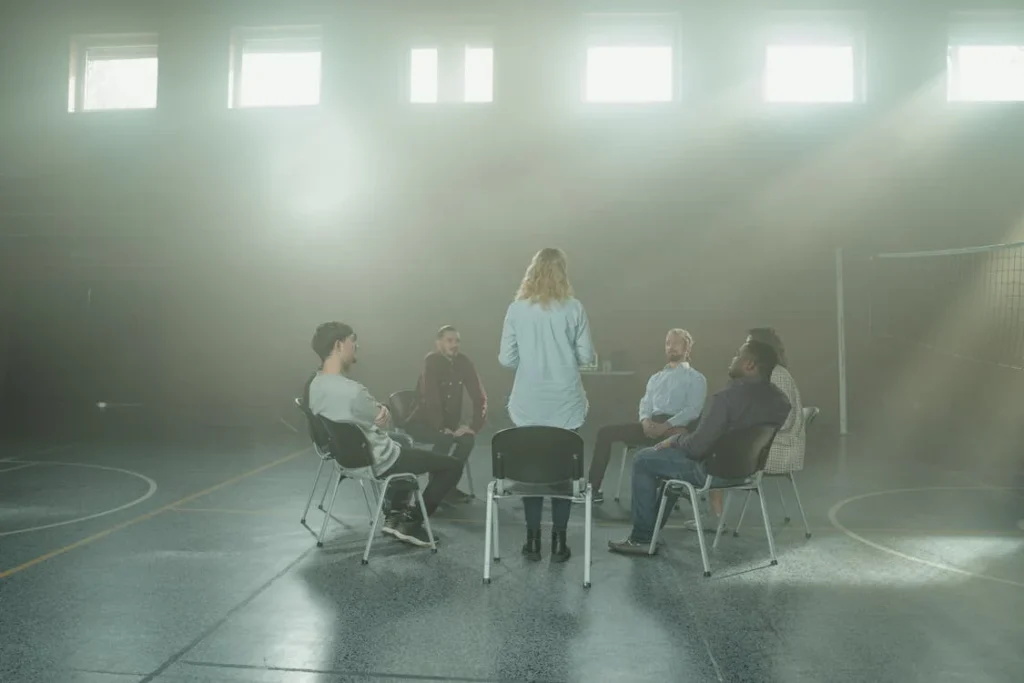
How Peer Support Groups Help with Prosthetic Adjustment
Learning to use a prosthetic limb can be a challenging process. It takes time, patience, and practice. Many amputees feel frustrated when their prosthetic doesn’t feel natural right away.
This is where peer support groups can make a big difference. Talking to others who have gone through the same struggles can provide practical tips, encouragement, and reassurance that adaptation is possible.
Learning from Others’ Experiences
One of the biggest advantages of being part of a support group is the opportunity to learn from people who have already adjusted to using a prosthetic.
They can share real-life experiences about what worked for them and what didn’t. From putting on and taking off a prosthetic to managing discomfort, these small but crucial insights can make the learning process much smoother.
New amputees often have many questions: How long does it take to get used to a prosthetic? What exercises help with balance? How do you handle discomfort?
While doctors and prosthetists provide medical advice, peer support groups offer practical, everyday solutions from those who have lived it. These firsthand experiences can make adjusting to a prosthetic feel less overwhelming.
Overcoming Frustration and Setbacks
Adjusting to a prosthetic limb isn’t always a smooth process. There will be days when things feel uncomfortable, when walking feels unnatural, or when tasks that seem simple become frustrating. In these moments, it’s easy to feel discouraged.
Being part of a support group helps amputees realize that these challenges are normal. Hearing others share their struggles and how they overcame them makes it easier to stay motivated.
Instead of feeling like a failure, an amputee can see that setbacks are just part of the learning process.
Support groups also offer encouragement. When someone feels like giving up, a fellow amputee who has faced the same struggle can say, “Keep going—it gets easier.” This kind of motivation can be the push someone needs to keep trying, even when things feel tough.
Boosting Confidence in Public Spaces
One of the biggest concerns for many amputees is how they will be perceived by others when using a prosthetic in public. It’s common to feel self-conscious, worry about how people will react, or fear standing out. These concerns can make it difficult to step out with confidence.
Peer support groups help normalize the experience of using a prosthetic. Seeing others wear their prosthetics with pride can inspire new amputees to do the same.
Support groups often share tips on dealing with public reactions, responding to questions, and carrying oneself with confidence. Over time, what once felt intimidating becomes second nature.
At Robobionics, we believe that a prosthetic should not just restore function but also empower the user to live confidently. Our advanced prosthetics, like Grippy™, are designed to be intuitive and comfortable, making the transition smoother.
If you’d like to explore how our prosthetics can help you regain independence, book a free demo with us today.
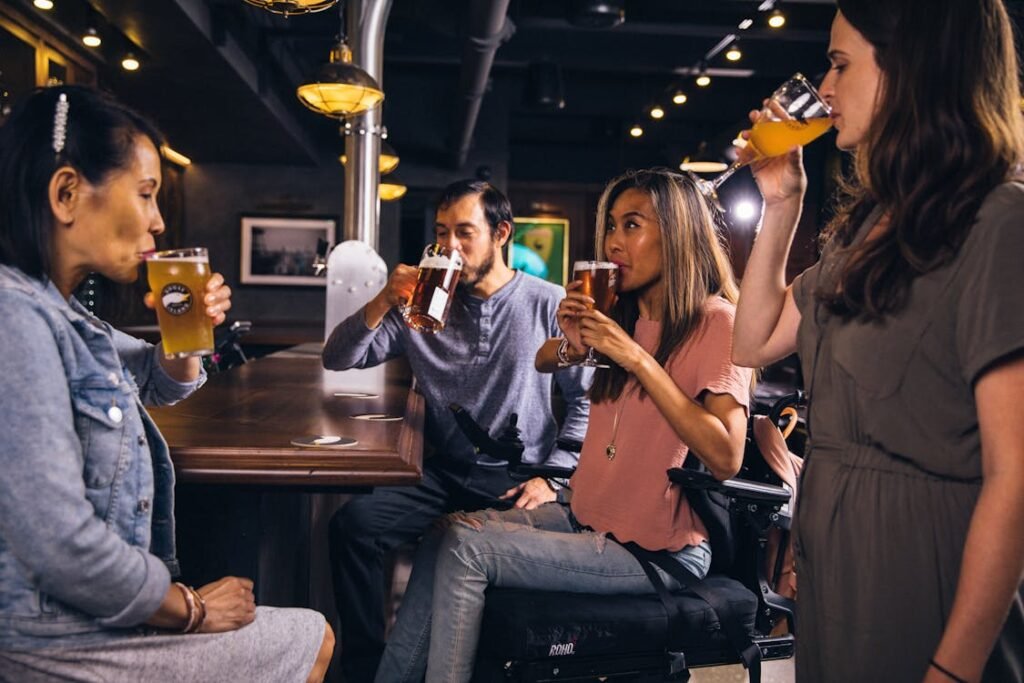
The Long-Term Benefits of Being Part of a Peer Support Group
Peer support groups don’t just help in the early stages of recovery—they offer long-term benefits that can positively impact an amputee’s entire life.
As time passes, the challenges of amputation evolve. New situations arise, such as returning to work, traveling, or participating in physical activities.
Being part of a support group provides continuous learning, motivation, and a sense of belonging that lasts well beyond the initial recovery period.
Building Lifelong Friendships
One of the most meaningful benefits of joining a peer support group is the friendships that form. Many amputees find that the people they meet in these groups become lifelong friends.
There is something deeply special about connecting with someone who truly understands your experiences without explanation.
Friendships within a support group go beyond amputation. They extend to everyday life—celebrating achievements, providing emotional support during difficult times, and sharing in life’s joys. These friendships offer a sense of belonging that can be difficult to find elsewhere.
For those who feel isolated or misunderstood, these relationships can be life-changing. The knowledge that someone is always there to offer encouragement, advice, or simply a listening ear can bring immense comfort.
Staying Motivated to Lead an Active Life
Many amputees worry about maintaining an active lifestyle after limb loss. Some may feel hesitant to engage in physical activities, while others may struggle with motivation. Seeing other amputees participate in sports, exercise, and hobbies can be incredibly inspiring.
Support groups often introduce members to adaptive activities such as running, swimming, yoga, or even extreme sports. Watching fellow amputees push their limits proves that anything is possible.
This motivation encourages members to set goals for themselves and try new things without fear.
Additionally, regular interaction with a peer group fosters a mindset of growth and self-improvement. Whether it’s practicing with a prosthetic, improving mobility, or learning new skills, the encouragement from a support group keeps members moving forward.
Giving Back and Helping Others
At some point, a member of a support group transitions from seeking help to offering it. Many amputees find purpose in mentoring others who are just beginning their journey.
Sharing experiences, offering encouragement, and guiding new amputees through their challenges can be deeply fulfilling.
Helping others also reinforces personal growth. When someone realizes how far they have come and how much they have learned, it strengthens their confidence and resilience.
Supporting others creates a cycle of positivity—new members receive hope, and experienced members find meaning in their journey.
At Robobionics, we believe that no amputee should navigate their journey alone. Community support is key to long-term confidence and success. If you’re looking for a prosthetic that empowers you to live actively and independently, contact us today to learn how we can help.
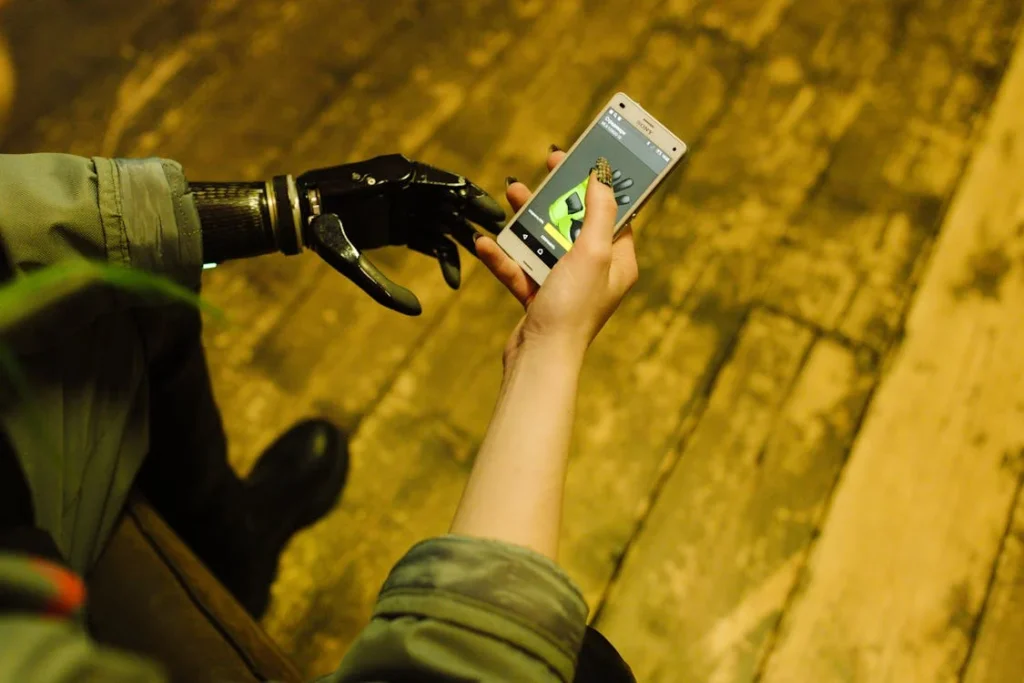
Finding the Right Peer Support Group for You
Not all support groups are the same. Finding the right one depends on your personal needs, comfort level, and the kind of support you are looking for.
Some groups focus on emotional healing, while others emphasize physical rehabilitation or social activities. The key is to find a group that makes you feel comfortable, motivated, and understood.
In-Person vs. Online Support Groups
Many amputees benefit from in-person support groups, where they can interact face-to-face with others. Meeting in person allows for stronger connections, hands-on demonstrations of prosthetic use, and real-time encouragement.
These groups often meet at hospitals, rehabilitation centers, or community spaces.
For those who don’t have access to an in-person group or prefer flexibility, online support groups are a great alternative.
Social media platforms, dedicated forums, and video chat groups provide a space to connect with other amputees from anywhere in the world. These groups can be especially helpful for individuals who live in remote areas or have limited mobility.
Both in-person and online groups have their advantages, and many amputees choose to participate in both. The important thing is to find a community where you feel supported and valued.
What to Look for in a Support Group
A good support group should create a positive and welcoming environment. The best groups focus on encouragement, practical advice, and shared experiences. It’s important to find a group that aligns with your needs and goals. Some key factors to consider include:
- A sense of openness and mutual respect among members
- A supportive atmosphere where everyone’s experiences are valued
- Experienced members who provide guidance and motivation
- A focus on both emotional well-being and practical solutions
If a group doesn’t feel like the right fit, don’t be discouraged. There are many different communities, and finding the right one can take time.
Making the Most of a Support Group
Simply joining a support group is not enough—you get the most value when you actively participate. Engaging in conversations, asking questions, and sharing your own experiences can make a big difference.
The more involved you are, the more you will benefit from the group’s support and encouragement.
If you feel hesitant at first, that’s completely normal. It takes time to open up and feel comfortable sharing personal experiences. Listening to others can be just as helpful in the beginning, and as you grow more confident, you’ll find it easier to contribute.
At Robobionics, we encourage amputees to seek support from peers who understand their journey. While our advanced prosthetics help restore mobility and function, we know that emotional healing is just as important.
If you are looking for guidance on how to navigate life after amputation, reach out to us today.
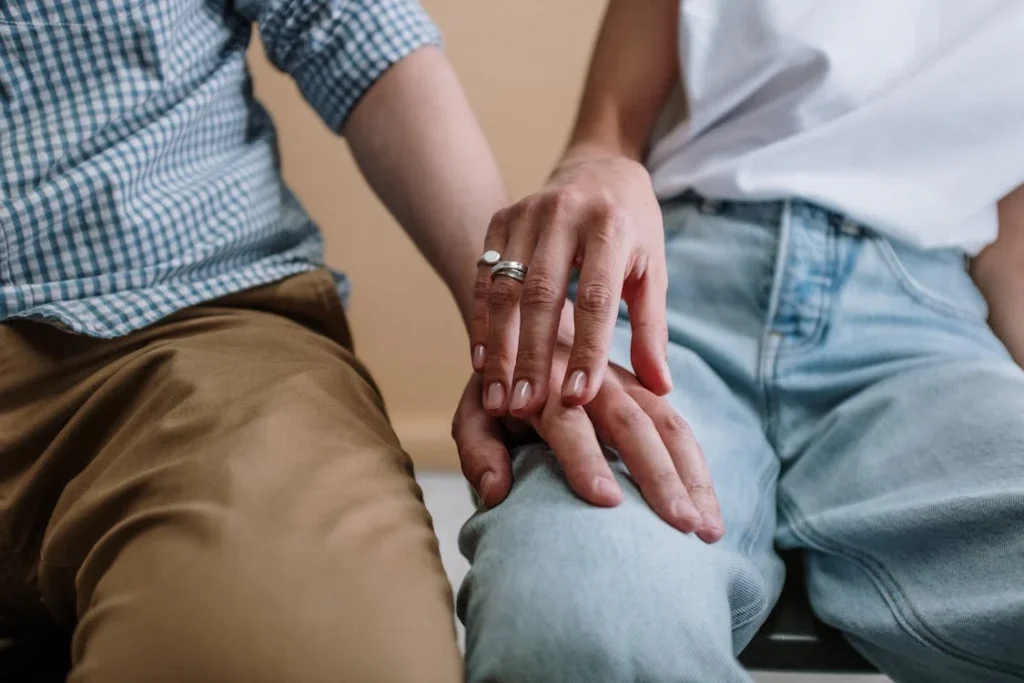
The Role of Peer Support in Long-Term Well-Being
While medical care and prosthetic advancements play a key role in an amputee’s journey, emotional and social well-being are equally important.
Peer support groups provide ongoing encouragement, helping amputees maintain a positive outlook even years after their initial recovery.
These groups are not just for people who are struggling; they are also for those who want to stay engaged, inspired, and connected to a strong community.
Staying Connected to a Support System
One of the biggest challenges many amputees face over time is staying motivated to continue their rehabilitation and adaptation process. As life gets busy, it can be easy to withdraw from activities that once felt important.
A peer support group acts as a reminder that growth is an ongoing journey. Seeing others continue to push boundaries encourages members to keep striving for their best quality of life.
Support groups also help amputees stay informed about the latest prosthetic advancements, rehabilitation techniques, and lifestyle adaptations.
Many members share personal experiences about new prosthetics they’ve tried, challenges they’ve overcome, and resources they’ve found helpful. This shared knowledge can help others make informed decisions about their own prosthetic care.
Preventing Feelings of Isolation Over Time
Even after years of living with an amputation, there may still be moments of emotional difficulty. Life changes such as aging, career shifts, or health challenges can bring new uncertainties.
Having a peer group to turn to during these moments provides a sense of security and belonging.
The truth is, life after amputation is a lifelong adjustment. Whether someone has been an amputee for one year or twenty, challenges will arise.
Knowing that there is always a community ready to offer encouragement, advice, and friendship makes a significant difference in overall well-being.
Giving Back to the Community
As time passes, many amputees in support groups naturally transition from receiving help to giving it. Sharing personal stories and insights with newer members creates a positive cycle of support.
It is incredibly rewarding to know that your own journey can help someone else navigate their early struggles.
Many long-time amputees take on mentorship roles, helping others through the initial stages of recovery and prosthetic adaptation. These mentorship relationships often grow into deep friendships built on mutual understanding and shared experiences.
At Robobionics, we believe that no amputee should have to navigate their journey alone. Along with providing high-quality prosthetic solutions, we encourage our users to engage with support networks that can offer emotional strength and practical guidance.
If you are looking for a prosthetic that supports both function and confidence, get in touch with us today.
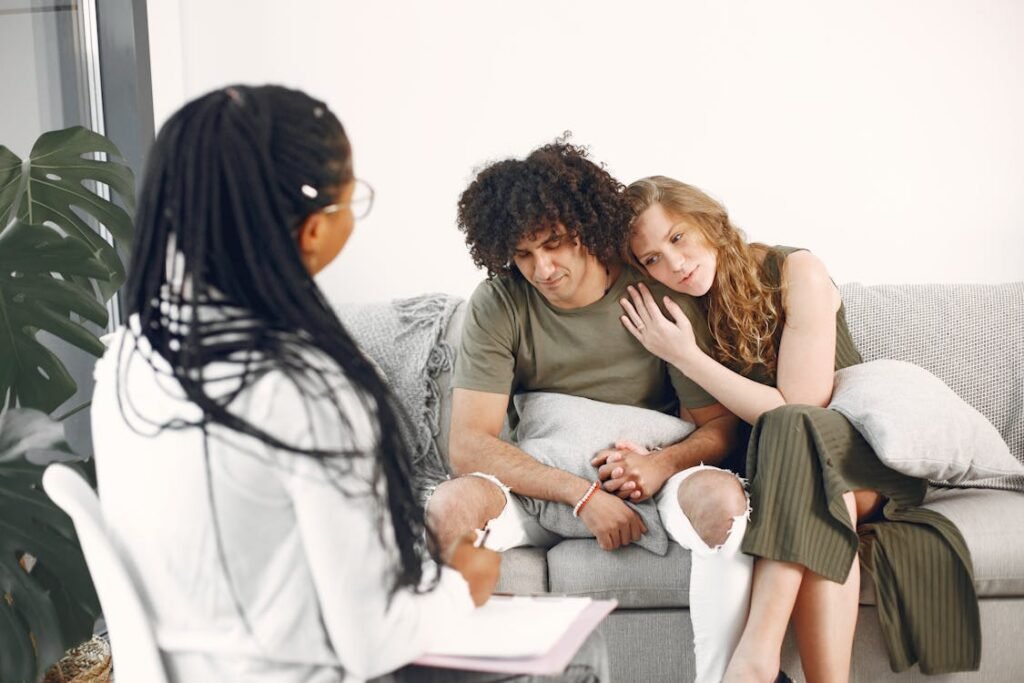
How Support Groups Help Family Members and Caregivers
An amputation doesn’t just affect the individual who loses a limb; it also has a significant impact on their family members, friends, and caregivers.
The people closest to an amputee often feel a mix of emotions—concern for their loved one’s well-being, uncertainty about how to provide the best support, and even their own feelings of sadness or anxiety about the change.
Support groups that welcome family members and caregivers create a space where they can learn, share experiences, and gain insight into the best ways to support their loved one’s recovery.
These groups offer emotional reassurance, practical guidance, and a deeper understanding of the challenges that come with amputation.
Understanding the Emotional Journey of an Amputee
One of the biggest challenges caregivers face is understanding the emotional impact of limb loss. Amputees often experience a rollercoaster of emotions, from grief and frustration to self-doubt and even moments of anger.
Family members who have never gone through a similar experience may struggle to relate, which can lead to misunderstandings or unintentional insensitivity.
Support groups give caregivers the opportunity to hear from experienced amputees who have processed these emotions firsthand.
Learning directly from those who have gone through the journey helps caregivers understand what their loved one may be feeling, even when they don’t express it openly.
This deeper awareness allows caregivers to respond with patience, empathy, and the right kind of encouragement.
Balancing Support and Independence
Many caregivers wrestle with finding the right balance between helping their loved one and allowing them the independence to adapt on their own.
The natural instinct is to assist with everything, but too much help can make an amputee feel dependent, frustrated, or even helpless. On the other hand, stepping back too much might leave them feeling unsupported.
Through peer support groups, caregivers can hear from other families who have found a healthy balance. They learn how to encourage their loved one to take small steps toward independence without rushing the process.
Understanding when to step in and when to let them figure things out on their own is a crucial part of helping an amputee regain confidence in their abilities.
Learning Practical Care Techniques
Caring for an amputee goes beyond emotional support. There are physical aspects of caregiving, such as assisting with wound care, helping with prosthetic maintenance, and understanding how to make daily tasks easier.
Support groups provide practical advice from others who have been in the same situation.
Hearing from caregivers who have successfully helped their loved ones adjust can be incredibly useful.
They share real-life experiences on things like helping with balance when using a prosthetic, setting up a home environment that is accessible, and ensuring proper limb health to prevent complications.
These firsthand experiences help new caregivers feel more prepared and confident in their role.
Managing Caregiver Stress and Burnout
Supporting an amputee can be emotionally and physically demanding, and caregivers often neglect their own well-being in the process. Many feel guilty for taking time for themselves or expressing their own frustrations, believing they should always be strong for their loved one.
Support groups provide a space for caregivers to talk about their own struggles without fear of judgment. Connecting with others who share the same challenges reminds them that their feelings are valid.
It also encourages self-care, helping caregivers understand that looking after their own well-being is not selfish—it is essential. A caregiver who is well-rested and emotionally balanced is better equipped to provide the support their loved one needs.
Strengthening Family Bonds Through Shared Support
Amputation affects family dynamics in many ways. Roles may shift, daily routines may change, and relationships may feel different.
Some families grow closer through the experience, while others face tension due to the stress of adjustment. Support groups offer guidance on how to navigate these changes in a healthy way.
By participating in discussions, family members learn how to communicate more effectively with their loved one. They also hear stories from other families who have strengthened their relationships through patience, understanding, and mutual support.
This shared learning fosters stronger family bonds, making the journey easier for both the amputee and their caregivers.
Conclusion
Peer support groups provide amputees with more than just advice—they offer friendship, motivation, and a sense of belonging. The emotional healing that comes from being surrounded by others who truly understand can be just as important as physical rehabilitation.
No one should have to face amputation alone. Whether through in-person meetings, online forums, or one-on-one mentorship, connecting with a support group can transform an amputee’s recovery journey. These communities provide not only guidance but also hope—a reminder that life after amputation is full of possibilities.
At Robobionics, we believe that a strong support system, advanced prosthetic solutions, and proper rehabilitation work together to create the best outcomes for amputees. If you’re ready to take the next step toward independence, contact us today to learn how we can support you on this journey.



